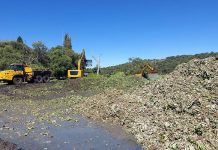Four million acres (1,62 million hectares) planted to maize has been destroyed by recent floods in the US Midwest, resulting in a hike of up to R300/t in the SA maize price. A senior trader at Grainvest Futures, Sakkie Cilliers, said the price has increased by as much as US$1,40 (R11,28) in two weeks from 5,80 (R46,74) a bushel to 7,20 (R58,03) a bushel. The floods hit the states of Iowa, Illinois, Indiana, Missouri and Nebraska.
Iowa was hardest hit with between 15% and 17% of the maize crop destroyed. “This will have a marked effect on international maize supplies, which are at their lowest levels since the 1970s,” explained Cilliers. “The destruction of 4 million hectares means a loss of 15 million tons. It doesn’t sound like a lot, but the low supplies can directly be linked to the biofuel industry and this is likely to continue given the high Brent oil prices. “is currently trading maize at import parity, which makes it some of the cheapest maize in the world.
To a certain extent the floods will counteract the huge increases in local input costs,” he concluded. It’s also speculated that the impact of the floods is less intense than expected. number of traders said the market is becoming more bearish because of factors such as the 2008 harvest already delivered. The late harvest also commenced in earnest during the last week of June, which had some influence on the markets. The exchange rate has also contributed to the current bearishness. – Annelie Coleman
Japan and Korea open doors to GM maize
organisations offering farmers a premium for non-GM maize for certain export markets may have to rethink their strategies, as Japan and Korea, both traditional buyers of non-GM maize, have decided to import GM maize for the first time this year. South Korea already imported 63 000t from the in May. Yoo Chang-kyu, an official from the South Korean association of maize processors, said the price of non-GM maize had doubled to about US$360/t (R2 904) and they had no choice but to import GM maize. It’s expected that Korea will import 1,3 million tons this year.
In Japan, Nihon Shokuhin Kako, the country’s biggest importer of maize for food, announced it plans to import 250 000t of GM maize this year. “The price gap between GM and non-GM is growing constantly and it’s becoming just too expensive,” it explained. Last year, Japan imported 16,6 million tons of maize and the country has already approved 36 varieties of GM maize. – Hans Lombard
The Aussie wheat monopoly is history
AUSTRALIA’s Labour government has ended the Australian Wheat Board’s 60-year monopoly on selling bulk wheat overseas, despite protests from wheat farmers. The Wheat Board had been found to have paid millions of dollars in bribes to Saddam Hussein’s regime in exchange for wheat sales to Iraq. Farmers say having competing export sellers will see the price set according to the lowest bids. Grower Jock Munro predicts the new system will hand the industry to multinationals, putting thousands of growers out of business.
“This is the most lethal, disgusting piece of legislation you’ll ever see,” he said. “It’s the blackest day for Australian agriculture.” In the visitors’ gallery at the House of Representatives farmers booed as the law was passed, and later held an angry news conference and disrupted parliamentary question time. However, agriculture minister Tony Burke argued the new scheme will give farmers the right to choose who exports their wheat. Burke elected six people to Wheat Exports Australia, the new organisation which will decide who is allowed to export wheat. Ted Woodley, former head of the New South Wales GrainCorp, will chair the organisation. O ne amendment approved in the Senate and accepted by government will allow individual growers to sell their wheat overseas. – Alan Harman
Global agriculture needs a rethink, says experts
The global food and fuel price crisis was high on the agenda at the recent Annual Bank Conference on Development Economics in Cape Town. Arvind Subramanian of the Peterson Institute in Washington, one of the international speakers, caused quite a stir when he called for the “burning” of the Doha round of trade negotiations. “Get over it.
The challenge for the World Bank regarding future food prices lies in agricultural research centres,” Subramanian told delegates. He argued the World Bank needs to rethink the type of support it provides agriculture and focus on doubling its lending for investments in specialist research centres. “Africa produces only a sixth of the world’s yields,” he said. ”It has become necessary for the World Bank to support research not necessarily in Africa itself, but for Africa.”
Prof Sheryl Hendriks, the University of KwaZulu-Natal’s head of Agricultural Sciences and Agribusiness, said the answer to combating food prices lay in increased production, but farmers faced too many uncertainties about land ownership to be prepared to make the necessary investments and expansions. S peakers also said shortages made it necessary to reassess the production of genetically modified food, which isn’t always allowed onto markets. – Louise Cook









